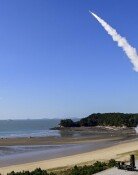[Focus] Significance of selection of IMT-2000 service operators
[Focus] Significance of selection of IMT-2000 service operators
Posted December. 15, 2000 19:26,
Consortiums led by SK Telecom and Korea Telecom have won licenses to offer IMT-2000 service.
LG Glocom, which applied for a license to offer IMT-2000 service based on W-CDMA (wideband code division multiple access) mode, and Korea IMT-2000, the only operator to apply for a license to offer CDMA (code division multiple access) 2000 networks, failed in their bids.
The Ministry of Information and Communications (MOIC) said that the screening committee made the selection in a fair manner based on the government's guidelines and data presented by prospective operators. It dismissed the possibility that outside pressure or corruption were involved in the process but some observers remained suspicion of the selection process.
Impact on the status of a CDMA power:
Information-Communication Minister Ahn Byung-Yub regretted the failure to select a service operator based on the CDMA 2000 mode. He said the government intended to select operators in both categories for the balanced development of the nation's telecommunication industry and a smooth advance into overseas markets but was unable to do so because the sole applicant was unqualified.
The procedure to select an operator based on the CDMA 2000 mode is scheduled to be held again next January.
But as powerful players such as SK Telecom and Korea Telecom were selected as the operators of the service based on W-CDMA mode, interest in the CDMA 2000 mode is likely to decline sharply.
Gains and losses of the screening process:
Prospective operators and the government invested enormous amounts of time and money in the selection process, which lasted for a year and a half. However, now that SK Telecom and Korea Telecom have obtained licenses for service based on W-CDMA mode and LG is also expected to be chosen as a CDMA-based service provider, critics say that the screening process was unnecessary. They say that the government should have sold the rights to the existing industry leaders for a profit instead of holding the screening process.
Due to the government's demand for consortiums, the number of the nation's telecommunication service suppliers has increased by three and it is expected that 5 to 6 trillion won will be required to merge them two to three years from now.
Some observers also criticized the screening for focusing on business plans rather than reviewing the applicants' ability to conduct the business. Thus, LG Glocom is now refusing to accept its failure claiming that it is the most competitive in technology among the three applicants but received the lowest score.
Challenges remain:
The government is unable to avoid the criticism that it lacked consistency in policy enforcement in the screening process, as it extended the deadline for document presentation and tried to shirk the responsibility.
The government is also facing a challenge to clear the negative aftereffects of the long battle and boost the competitiveness of the local telecommunication industry.
It also should improve the technological independence of domestic companies and defend the nation's IMT-2000 market while making efforts to expand overseas markets.
Selected operators are also under heavy financial burdens as they are now required to make about 5 trillion won in new investments. The cellular phone market has already reached its saturation point, so for the businesses, it is inevitable that they enter the second-generation communications device market.
Besides, the telecommunication industry is expected to suffer great hardships due to imminent restructuring and mergers and acquisitions.







